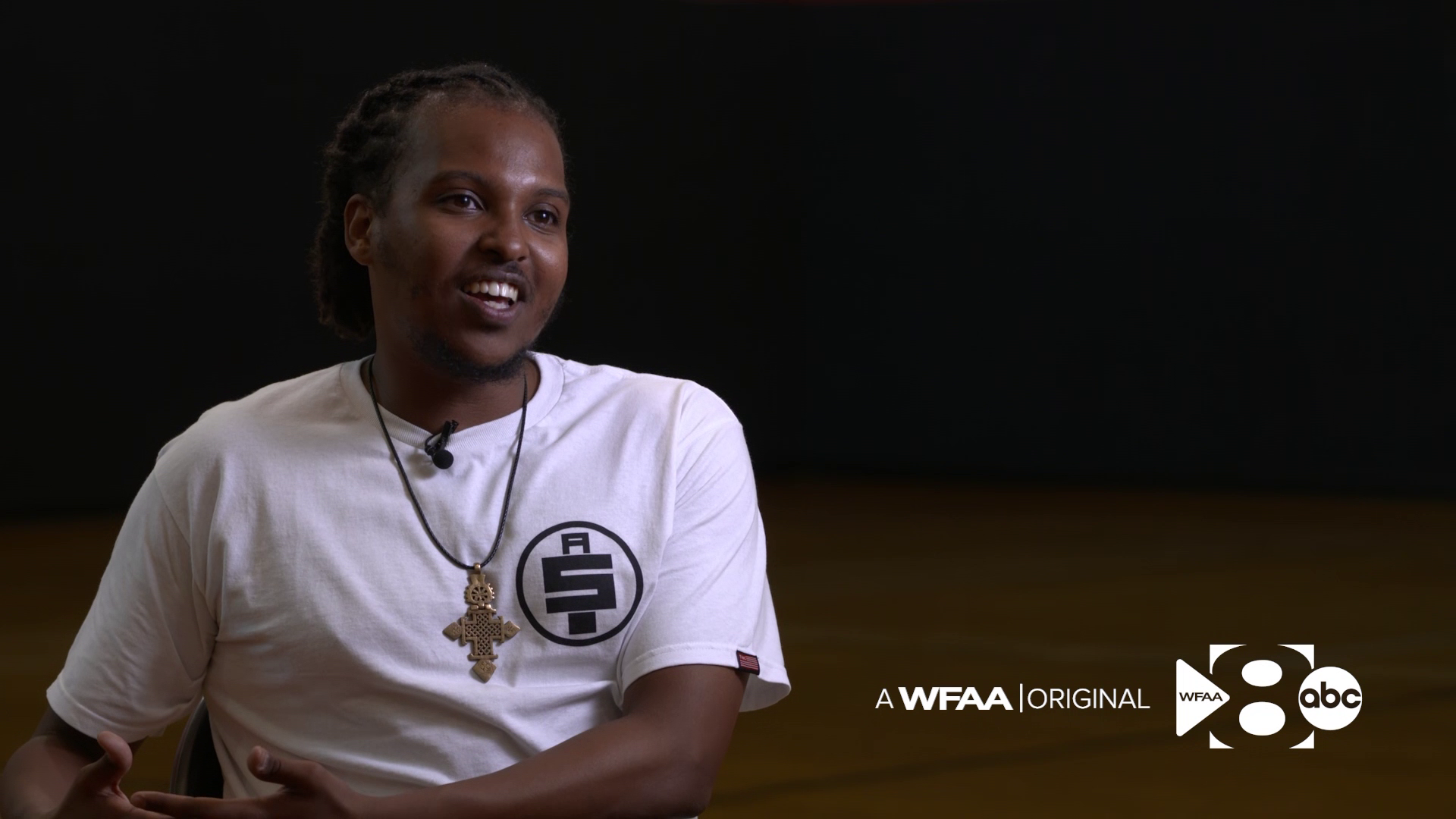IRVING, Texas — Master Tesfatsion is barely 30 years old, but he's already lived a big life.
He's traveled the world, faced hardship, pushed through situations that many would have crumbled beneath and still managed to create a career that many dream of. He gets paid to to chat it up with sports stars.
More notably, he's able to go past the generic interview and ask the tough questions, the personal questions -- the questions you don't get to ask if the person you're interviewing doesn't really really trust you.
They do.
He said that has everything to do with his own story.
“We didn’t have much to our name," Tesfatsion said. "You know, we grew up Section 8. We experienced a great deal of poverty. We experienced a great deal of suffering and a great deal of adversity.
Testfatsion's parents met at a refugee camp in Sudan after escaping their home country Eritrea. When they came to the United States, they initially settled in Dallas but later moved to Irving to be closer to their jobs at DFW Airport.
"We didn’t have much, you know," Testfatsion said. "Me, my sister and my little brother. We were all living in the same room."
Yet, as a child, he said he didn't realize he was living in poverty.
"Every day, you just run around with the different kids in the community," Tesfatsion said. "Playing football. Listening to different kinds of music. Cracking jokes. Having fun."
He said he made friends with kids in the neighborhood from many different backgrounds. He remembered realizing one of his friends no longer came outside anymore and having to learn he and his family had been deported. Those were the kinds of things he said first made him realize his curiosity about other people and the world around him.
"I was just always really curious about people and these different environments that they’re in," Tesfatsion said. "Just to understand their perspectives, getting to understand who they are as people.”
The other major part of his story is the Northwest Rec Center in Irving, where he met Daral McKnight. At the time, he oversaw the center. He described a young Testfatsion as a kid who wanted to try everything.
"He did basketball. He did dodgeball. He did pool. He did chess," McKnight said. “Whatever we had going on at the rec center, he participated in at the end of the day.”
Tesfatsion tried playing football in school but a knee injury took him out. Instead, he focused on a high school media tech class where his teacher gave him the responsibility of directing their newscast and encouraged him to make it into a career.
“I fell in love with it," Testfatsion said. "It was the first time I was learning how to be creative and truly appreciating that. I didn't have the resources. I didn't have the privilege. I didn't have the tools."
He said he also did not have the example, because typically, the only Black men he saw reporting on sports were former athletes.
However, with a push from his teacher and support from his mentor and family, he pulled out loans to attend Arizona State University. His first job out of college was covering the Texas Rangers for MLB.com. Then, he covered the Minnesota Vikings for the big local people in Minneapolis before moving on to the Washington Post, where he covered The Washington Football Team.
"That's when I realized 'Oh, nothing is impossible,'" Testfatsion said.
Today, he is a senior writer and on-air host for Bleacher Report. He was originally based in New York City, but moved back home to Irving during the pandemic.
"I never realized how much I missed home until I moved back," Testfatsion said.
However, you can see sprinklings of his "home" in his work.
His show "Untold Stories" has a set up where he interviews athletes while playing pool with them. He's wearing his regular clothes, and they are too. He asks them about who they were before they had million-dollar contracts and the often-awkward transition of adapting to that lifestyle. He asks them about difficult moments they've had in the press and on the field. He even asks about their beef with other players.
Tesfatsion learned to play pool at the rec center, which he described as a safe haven and a second home, he said he's learned he shares this experience with many of the people he interviews.
"It's a shared experience a lot of athletes also have at rec centers," Testfatsions said. "When you go these athlete’s cribs, they have these big pool tables in these big cribs. I always wanted to replicate that experience onto a set.
His background and his experiences give him the ability to connect with his subjects in a way that's deeper than the game.
“I think my perspective matters in a way that can resemble and bring out so many different perspectives and understandings of who these athletes are," Testfatsion said.
"Who these people are behind the scenes, outside of the sports world and the sports culture that people don’t always get to see that can make them more relatable more understandable. That’s exactly what 12 year old me would’ve wanted to see," he said.
It has not been easy, but Tesfatsion said he is having the most fun he's ever had. He just started his own production company and has been able to continue filming his show. He's built a career on authenticity, connection and letting where he came from be a stepping stone to where he wants to be.
“Black identity is important, and that identity goes beyond rushing for 300 yards or throwing for five touchdowns," Tesfatsion said. “Those athletes represent a family, a community, people, a city, a region, a sub culture. Those things are just as important, if not more important than what they do on the football field."
His passion is making sure those stories get told.

